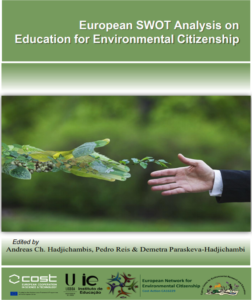Chapter 17: Education for Environmental Citizenship in PORTUGAL – A SWOT Analysis
Pedro Reis
Abstract: This chapter presents the views of Portuguese experts regarding the Strengths, Weaknesses, Opportunities and Threats of Education for Environmental Citizenship. Seven experts – two teachers, one policy-maker and four researchers/academics – answered the questionnaire developed by the European Network for Environmental Citizenship (ENEC). This analysis shows that the Portuguese Government has supported the main principles behind the concept of Education for Environmental Citizenship (Citizenship Education and Environmental Education for Sustainability) throughout the last three decades. The participating experts have a very positive stance on this approach primarily because of its potential to: 1) ad-dress real problems, create meaningful learning contexts and motivate the students’ involvement in school activities; 2) empower the students with the knowledge, skills, values and commitment to take the appropriate, responsible and effective actions required for active citizenship with regards to environmental problems; and 3) contribute to changing behaviours to the environment and towards a more democratic and just society. However, they believe that the implementation of Education for Environmental Citizenship is compromised by the lack of teachers’ knowledge regarding this approach, by a school culture that is not very supportive of collaborative and dialogical practices, and by a lack of communication and coordination between teachers and school subjects. So, teacher education programmes are considered indispensable for the understanding and large-scale implementation of Education for Environmental Citizenship.

